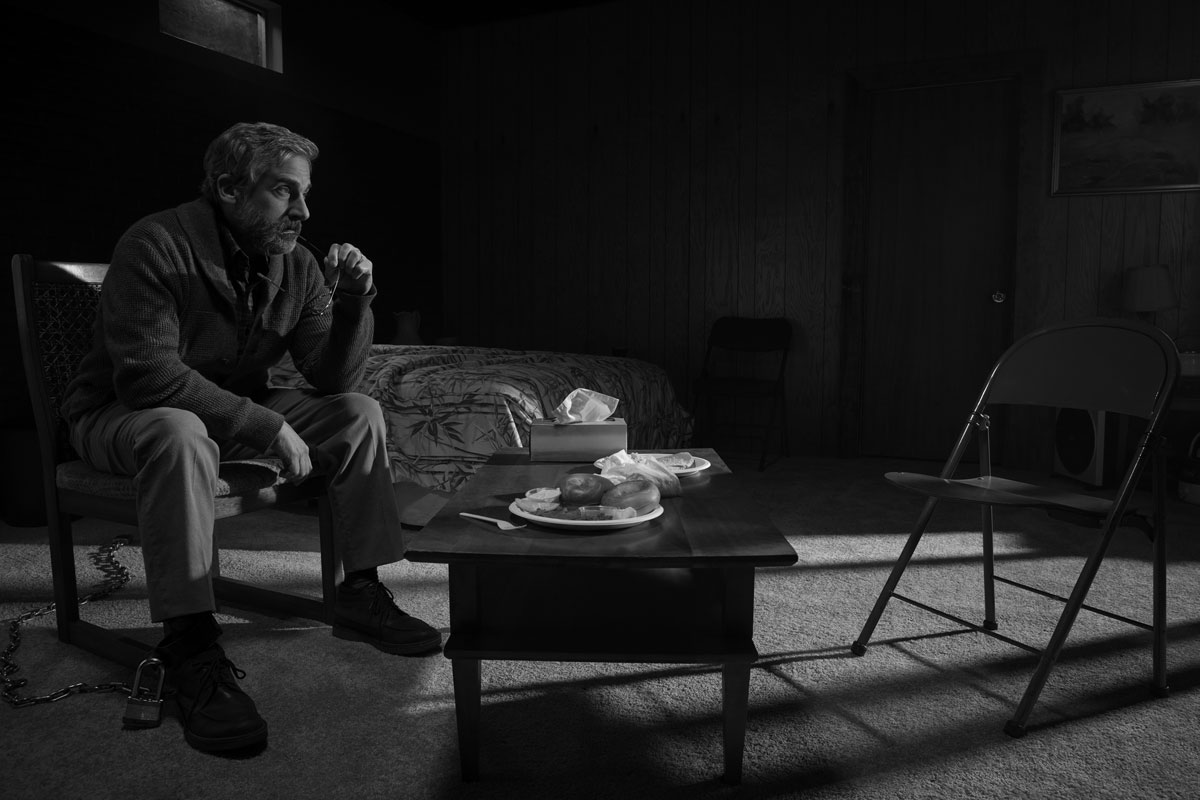(Spoilers ahead for “The Patient”)
Though I desperately wished it would not happen, I was braced for the outcome of “The Patient,” the dark Hulu drama starring Steve Carell most credibly as Dr. Alan Strauss, a Jewish psychologist being held hostage by Sam Fortner, a psychotic patient. If ever a television show reflected the hopeless, horrific zeitgeist of our dystopian time, it is “The Patient.”
I occupied the claustrophobic universe of “The Patient” for the past 10 weeks, captivated by its inside-baseball Jewish references and cultural touchstones. There was the son who became a ba’al teshuva, neo-Orthodox Jew, with all the tensions that ensued. There was the (dead) wife who had worked as a smiley, Debbie Friedman-like, guitar-toting cantor at a Reform synagogue. There was a surprising “bentching” scene featuring Birkat HaMazon, the Grace After Meals, sung in Hebrew. There was wise, wry Dr. Charlie Addison, Dr. Strauss’s mentor. There was Viktor Frankl, founder of Logotherapy, author of “Man’s Search for Meaning” and survivor of Auschwitz. There were scenes from Auschwitz itself: the barracks, gas chambers, striped prisoner’s garb, plumes of smoke from chimneys.
As the daughter of a clinical psychologist and pulpit rabbi who is approaching her father’s second yahrzeit, or anniversary of death, I know I will be forgiven for the hubris of believing that someone produced this show expressly for me. Within every episode I found aspects of my father and the world he inhabited, a place that exists at the nexus of psychology, Judaism and metaphysics. After every episode, I longed to discuss the plot with my father, analyze the characters. What did he think about the imagined conversations between Dr. Strauss and Charlie? Did they ring true? I recall my father talking about his mentor. What was my dad’s take on Ezra, the Orthodox son who refused to be present at his mother’s deathbed? My dad’s doctoral dissertation in clinical psychology at St. John’s University was about intrinsic and extrinsic religiosity, drawing on the writings of Alfred Adler. A 2005 essay he wrote for the Rabbinical Assembly called out the limitations of religion in addressing human suffering and stated that a knowledge of the inner workings of the human psyche was necessary for a rabbi.
What would my father think of Sam’s mother, moving around the house like a frightened mouse, aware of her son’s murderous compulsion and the entrapped therapist, unable or unwilling to take action? And what would my father have made of the show’s denouement, where Dr. Strauss decides he cannot remain in the basement any longer “like a pet?”
The show’s dialogue was so familiar to me that I have started to wonder whether its writers/producers — Joel Fields and Joe Weisberg — were former patients of my father or whether they had been seat mates on a long plane ride, say, from New York to Los Angeles.
Perhaps they were. When my father died, on October 31, 2020, hundreds of condolences poured in from former congregants, friends and patients. My entire adult life I have been asked whether I am my father’s daughter. He touched many people’s lives. His influence was profound.
And I am my father’s daughter in so many ways. I inherited his meaning-focused philosophy on life, his perception of the transcendent, his belief in I-and-Thou relationships. I miss his wise counsel, his penchant for curating the chaotic world, his insight, kindness, his belief in the transcendent. His deep caring and empathy. So many terrible things have happened since he died. I have longed for him to contextualize the alarm I feel but I know that feeling alarmed by the current state of affairs is simply proof that I am conscious.
My father would be alarmed. During the last week of his life, we watched the news together in his room at St. Francis Hospital. It was just a week before the election. Trump, as usual, was ranting. My father’s face contorted in disgust. “What will be?” he asked, with deep sadness. He was leaving and the world was not OK.
“We fight,” I replied. “You raised me for a moment like this.”
Tuesday night was the final episode of “The Patient” and I am bereft. Dr. Alan Strauss became a stand-in for my father for the past 10 weeks, a television surrogate: wise, kind, suffering.
This show is about so much: disappointment; the therapeutic process; how early trauma colors all our human relationships; how human beings retain their free will even in the most dire of situations.
“The Patient” is not just about specific — and highly compelling — characters, but about the time-honored truth that evil occurs because people of conscience stand by, silently. The killer’s sad-eyed, defeated mom is a stand-in for all the “good people” who commit this sin of omission.
“The Patient” is about this very moment in America. An existential threat is in the air. We feel trapped. What will be?
Though I hoped for a deus ex-machina resolution — the arrival of cops or Dr. Strauss’s adult children who were plastering “Missing” posters all over town, or for Sam’s passive mom to come to her senses — the trajectory of “The Patient” was preordained, a descent into doom. The embedded message of “The Patient” is: Attention must be paid. The fate of our people, our nation and our world hangs in the balance.
Dr. Alan Strauss may not be Everyman but I believe he is Every Jew. He is the Jew in history. He is the Jew now.
And while I knew that Dr. Alan Strauss would not be getting out of the basement where he was shackled by Sam, his serial killer patient, I did not know that the show would end with the perfect coda of Leonard Cohen’s “You Want it Darker” — playing while the credits rolled — magnifying and sanctifying the show’s themes with the songwriter’s personal theology:
A million candles burning/For the help that never came/You want it darker
Hineni, hineni/I’m ready, my Lord.








